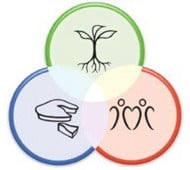Hello! Thank you for creating this community. I hope these sort of text discussion posts are okay.
I’d like to know - how do people here practice permaculture? What sort of habits have you created? What sources do you learn from?
I’m a suburb-bound person who is constantly trying to bring more permaculture practices into my life, and spaces that show me what others are doing really help.


Well I live out in the woods now but when I lived in the city practicing permaculture was all about taking small steps and thinking in systems. I started a compost bucket for the apartment for everyone to fill up. Then I had to learn about compost. Now I didn’t have a lot of space out back so I got a worm bin. Now I was using nature to process my food waste and building a system. Now I had worm casings So in spring I found the one small section of earth I had available to me (2ft x 8 ft) and planted some cucumbers, tomatoes, and squash. The whole time I am learning and trying to understand how these want to interact and how I can expand this system.
Then I found this thing called a “Garden Tower” which grows plants vertically, can rotate on its axis, has a center tube for worms and food scraps as well as a reservoir to collect the excess water. Now I wanted to collect rain water to passively water my little plot and this new garden tower. Next I got some big pots and planted a fig tree and some blueberries.
At this point I had : Produced no waste produced a yield catch and store energy applied self regulation and accepted feedback started small and used small and slow solution Observe and interact Used edges and value the marginal used and valued renewable resources integrated instead of segregated And creatively use and respond to change
IMO its really just about watching nature and seeing how she does it- then working to mimic it. Also a healthy bit of laziness helps as it makes for coming up with creative solutions to make most of the task that need to get done passive (i.e. collecting rain water from the downspout to fill a barrel that then drip waters all your plants using terra cotta watering spikes -blumat if your curious - passively so you never have to worry about forgetting to water your plants.
… then Covid hit- my metal fabrication shop shut down, I took the stimulus check to take a Permaculture Design Course, and took the opportunity to move to as small town in NH and worked at a local community farm. Built a bigger permaculture system at my new place with more knowledge and a bit more space to work with as I worked the farm and took a carpentry job. to learn how to build with wood as opposed to steel. Got chickens to add to the system and cycle nutrients. Did an internship with Ben Faulk of Whole Systems Design. If your looking for someone who is practicing permaculture well - IMO he’s one to check out. Permies.com is a great resource as well. Active forums for all things permaculture as well as homesteading.
Pretty long winded way of saying - Collect your food scraps and start learning how to compost, grow something, anything that will produce something you can eat( its so satisfying), see if you can devise a way to capture some rain water to water your plants, but more importantly - start thinking in natural system - not man-made. Look at how nature does things and see if you can recreate it. Don’t over plan- just experiment and see what happens. It’s not a computer, it’s nature so meticulously planning and over analyzing isn’t going to work. Nature is messy, complex and yet endlessly beautiful if you take the time to observe it.
Inhabit is a good documentary I remember getting on jazzed on a while back.
If you need any more book recommendations or information just message me - I’m not by bookshelf but have acquired some good books over the years. Happy to Help